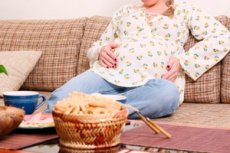Medical expert of the article
New publications
Overeating in pregnancy
Last reviewed: 08.07.2025

All iLive content is medically reviewed or fact checked to ensure as much factual accuracy as possible.
We have strict sourcing guidelines and only link to reputable media sites, academic research institutions and, whenever possible, medically peer reviewed studies. Note that the numbers in parentheses ([1], [2], etc.) are clickable links to these studies.
If you feel that any of our content is inaccurate, out-of-date, or otherwise questionable, please select it and press Ctrl + Enter.

The issue of motherhood is a serious topic that should be approached with full responsibility. Even before conception, a woman's task is to prepare her body for bearing a healthy child. First of all, to do this, it is necessary to eat right and avoid overeating.
The issue of proper nutrition during pregnancy worries all expectant mothers. And this is not surprising, since the problem of overeating during pregnancy is quite relevant. Women in this position often get carried away with eating prohibited foods, citing the peculiarities of the hormonal background. At first glance, this causes affection, but threatens serious problems for both the baby and the expectant mother.
 [ 1 ]
[ 1 ]
Consequences
Eating disorders during pregnancy lead to all organs experiencing increased stress. This has a negative impact on overall well-being. The main consequences of food abuse include:
- Rapid weight gain.
- Increased stress on the cardiovascular system.
- Pressure surges.
- Digestive problems.
- Varicose veins.
- Back pain.
- Late gestosis.
- Preeclampsia.
- Problems with the musculoskeletal system.
- Increased fatigue.
Consuming excess food also has a negative effect on the fetus. Since the pregnant woman experiences metabolic disorders, this causes disruptions in the child's nutrition. Increased blood pressure, kidney disease and other complications on the part of the mother's body negatively affect the development of the baby. In particularly severe cases, oxygen starvation develops, which can lead to a miscarriage.
What to do and how to prevent overeating during pregnancy?
In the early stages of pregnancy, it would not be superfluous to develop a special diet for the normal development of the fetus and the healthy functioning of the woman's body. It is necessary to ensure that the body receives the maximum amount of vitamins and minerals. A balanced diet will help avoid gaining excess weight during pregnancy and will not cause complications associated with it.
In order to minimize eating disorders during pregnancy, a woman should organize a daily routine. When choosing products, preference should be given to natural and easily digestible ones. Various semi-finished products, too spicy, salty, fatty or fried dishes are prohibited. The task of the expectant mother is to provide a balanced diet so that while in the womb, the child receives a full range of useful substances and minerals.

